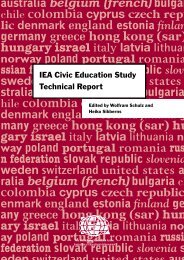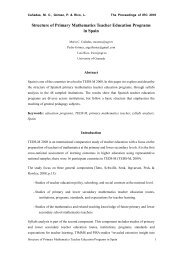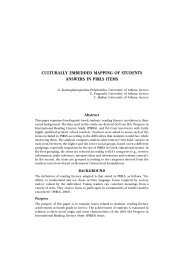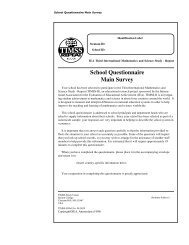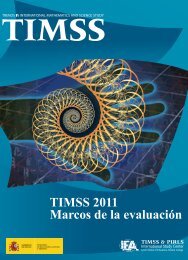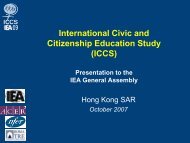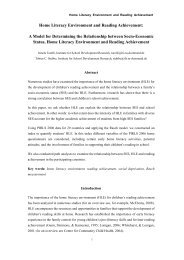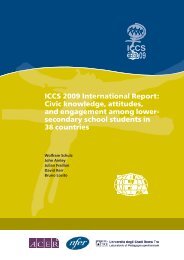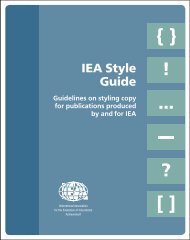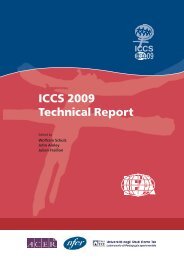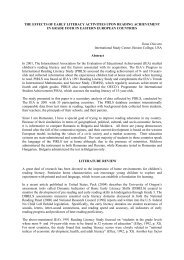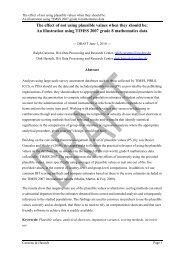International civic and citizenship education study - iccs - IEA
International civic and citizenship education study - iccs - IEA
International civic and citizenship education study - iccs - IEA
- TAGS
- civic
- citizenship
- iccs
- www.iea.nl
Create successful ePaper yourself
Turn your PDF publications into a flip-book with our unique Google optimized e-Paper software.
<strong>citizenship</strong> content in three domains. The three domains of the CIVED conceptual model of<br />
<strong>civic</strong>s <strong>and</strong> <strong>citizenship</strong> are:<br />
• Domain I: Democracy/Citizenship<br />
• Domain II: National Identity/<strong>International</strong> Relations<br />
• Domain III: Social Cohesion/Diversity.<br />
A set of the secure CIVED trend cognitive items <strong>and</strong> items from some of the attitude <strong>and</strong><br />
concept CIVED scales are included in the ICCS assessment instruments.<br />
Representing <strong>civic</strong>s <strong>and</strong> <strong>citizenship</strong> in the ICCS assessment framework<br />
The ICCS assessment framework is organized around three dimensions: a content dimension<br />
specifying the subject matter to be assessed within <strong>civic</strong>s <strong>and</strong> <strong>citizenship</strong>; an affectivebehavioral<br />
dimension that describes the types of student perceptions <strong>and</strong> activities that are<br />
measured; <strong>and</strong> a cognitive dimension that describes the thinking processes to be assessed.<br />
The four content domains in the ICCS assessment framework are:<br />
• Content Domain 1: Civic society <strong>and</strong> systems<br />
• Content Domain 2: Civic principles<br />
• Content Domain 3: Civic participation<br />
• Content Domain 4: Civic identities.<br />
It is important to distinguish the different types of student perceptions <strong>and</strong> behaviors relevant<br />
within the context of <strong>civic</strong>s <strong>and</strong> <strong>citizenship</strong>. For this purpose, four affective-behavioral domains<br />
are identified in the ICCS assessment framework:<br />
• Affective-behavioral Domain 1: Value beliefs<br />
• Affective-behavioral Domain 2: Attitudes<br />
• Affective-behavioral Domain 3: Behavioral intentions<br />
• Affective-behavioral Domain 4: Behaviors.<br />
Similar to the domains within the assessment framework for TIMSS (Mullis, Martin, Ruddock,<br />
O’Sullivan, Aroa, & Erberber, 2005), the cognitive domains in the ICCS assessment framework<br />
define the cognitive processes assessed with test items. The two cognitive domains in the ICCS<br />
framework are:<br />
• Cognitive Domain 1: Knowing<br />
• Cognitive Domain 2: Reasoning <strong>and</strong> analyzing.<br />
Mapping assessment domains to the assessment instruments<br />
The ICCS assessment of the outcomes of <strong>civic</strong> <strong>and</strong> <strong>citizenship</strong> <strong>education</strong> comprises two<br />
instruments:<br />
• A student test measuring cognitive processes<br />
• A student questionnaire measuring perceptions <strong>and</strong> behaviors.<br />
The data from the cognitive test will be used to construct a scale of <strong>civic</strong> <strong>and</strong> <strong>citizenship</strong><br />
knowledge <strong>and</strong> underst<strong>and</strong>ings as described by the two cognitive domains, <strong>and</strong> representing<br />
the substance of the four content domains.<br />
The data from the student questionnaire will be used to articulate perceptions constructs<br />
pertaining to the four affective-behavioral domains <strong>and</strong> relating to the substance of the four<br />
content domains. The amount <strong>and</strong> type of assessment information accessed by each instrument<br />
will vary across the four content domains.<br />
ICCS ASSeSSment FrAmework<br />
13



